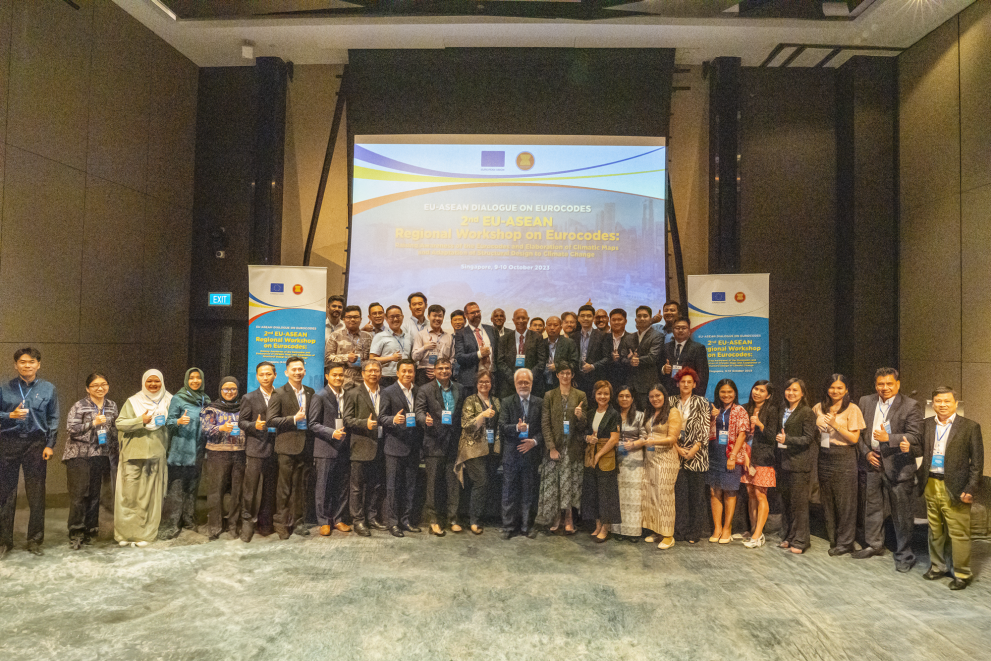
Many countries outside the European Union have shown interest to update their National Standards for structural design of building and infrastructures, based on technically advanced codes. In this sense, climate change issues are often a major motivation. With the EN Eurocodes, due to their peculiar feature of flexibility - namely, the capacity to facilitate national specifics by means of the Nationally Determined Parameters (NDPs) - adaptation of structural design to climate change is feasible.
As of today, the Eurocodes have been adopted – either in full or in part – by some ASEAN (Association of Southeast Asian Nations) Member States (AMS), namely Singapore and Malaysia. Other AMS (Brunei, Cambodia, Thailand and Vietnam) are currently at various stages of awareness of the Eurocodes concepts and/or their adoption at the national level. Within this context, the European Commission’s Enhanced Regional EU-ASEAN Dialogue Instrument (E-READI) provides assistance to facilitate the ASEAN countries to benefit from greater awareness and understanding of the content, principles, and benefits of the Eurocodes through a regional approach.
Besides the overarching objective of increasing the awareness and understanding of the Eurocodes, this Second EU-ASEAN Regional Workshop on Eurocodes had the specific aim of outlining the needs and the availability of technical assistance in support of the elaboration of maps for climatic actions for structural design with the Eurocodes and adaptation of structural design to climate change in AMS.
This was the first Eurocodes Dialogue E-READI event being held both in physical presence and online. This format allowed strengthening the personal contacts between the stakeholders, while accommodating a large number of online participants. In total, over 180 designated participants attended the event, with 46 of them being in person in the meeting room. All ASEAN Member States had representatives at the Workshop, with the top 3 countries by the number of participants being Cambodia (98), Thailand (22), Brunei Darussalam (19) and Malaysia (19).
Welcome speeches were delivered by Mr Thanabal Kaliannan (Group Director, Building Resilience/ Commissioner of Building Control, Building and Construction Authority, Singapore), Mr François Augendre (Head of Unit E.3 'Safety and Security of Buildings', Directorate for Space, Security and Migration, Joint Research Centre of the European Commission), Prof Steve Denton (University of Bath, Chair of CEN/TC 250 'Structural Eurocodes'), H.E. Sujiro Seam (Ambassador of the EU to ASEAN), Ms Masdara Siregar Mohd Samsir (Deputy Under Secretary at the Ministry of Works Malaysia, Chair of the ASEAN Building and Construction Working Group), and finally Mr Aldo Dell’Ariccia (E-READI Team Leader). In particular, H. E. the Ambassador recalled that the ASEAN region has been identified as one of the most vulnerable regions to the impact of climate change; addressing the risks posed by climate change requires substantial mitigation and adaptation action to avoid catastrophic long-term impacts, and to cope with the unavoidable impacts of climate change that we are already experiencing today.
During five workshop sessions, four experts from CEN/TC250 shared knowledge and provided awareness increase for the different stakeholders attending the workshop - policymakers, standards writers, representatives of engineers, industry, academics - as well as detailed technical contents. The lectures covered the nature of Eurocodes as standards for structural safety (Dr Mark Lurvink, Secretary of CEN/TC 250/WG 6); the characteristics of EN 1990 'Basis of Structural Design' and the next developments in the Second Generation Eurocodes (Prof Paolo Formichi, Chair of CEN/TC 250/SC10); the relevant parts of EN 1991 'Actions on Structures' (Dr Nick Malakatas, Chair of CEN/TC 250/SC1); finally, the elaboration of National Annexes to wind and thermal action parts and the emerging climate issues in thermal design of the structures were presented by Prof Pietro Croce (Convenor of CEN/TC 250/HG 'Bridges').
Then, the ASEAN experience in climate change studies and elaboration of National Annexes to the Eurocodes was presented by Mr Kabi Subramaniam (Arup Singapore) and Prof Azlan bin Adnan (Universiteti Teknologi Malaysia), enlightening the available expertise in the ASEAN region. In particular, Malaysia has recently progressed in Eurocodes implementation by being the first ASEAN MS to obtain access to the JRC NDPs Database.
The EU support for the adoption and implementation of the Eurocodes was illustrated by Dr Silvia Dimova (JRC), Dr Adamantia Athanasopoulou (JRC), Dr Francesca Sciarretta (JRC), Dr Maria Luisa Sousa (National Laboratory of Civil Engineering - Lisbon, Portugal, formerly at JRC) and Prof Roberta Apostolska (E-READI Senior Expert), with a particular focus on the Western Balkans experience.
The workshop was concluded with a site visit at the Civil and Environmental Engineering Department of the National University of Singapore, which featured a guided tour of the Structural Engineering and Hydraulic Engineering Laboratories. Both during the workshop and the site visit, the time schedule devoted particular importance to Q&A, panel sessions, discussion and networking.
At the end of the workshop, Ms Minna-Liisa Saneri (E-READI Team) announced the planned activities, which include a training and capacity building workshop, a study trip for ASEAN experts to JRC/CEN MS, facilitation of a twinning project between AMS universities on specific topics, support to AMS in elaboration of National Annexes to Eurocodes, e-learning courses, expert sessions and webinars for the private sector.
Note: JRC leads, jointly with the ASEAN Building and Construction Working Group (ASEAN: Association of Southeast Asian Nations), the EU-ASEAN Eurocodes Dialogue. The Eurocodes Dialogue is held under the Enhanced Regional EU-ASEAN Dialogue Instrument (E-READI) by DG INTPA and strengthens both ASEAN regional integration and the overall EU-ASEAN partnership in the area of construction. The activities within the EU-ASEAN Eurocodes Dialogue promote the EU standards in construction and may facilitate the use of the European standards for construction in future investments under Global Gateway initiative.
Read the event booklet
Details
- Publication date
- 11 October 2023
- Eurocodes
- Not associated with a specific Eurocode
